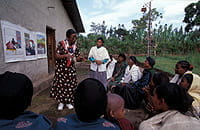
Articles
Building capacity
An interview with Mulugeta Dejenu, based in Ethiopia, who works as a Regional Advisor for Tearfund
2004 Available in Portuguese, Spanish, English and French

Photo: Mike Webb/Tearfund
An interview with Mulugeta Dejenu, based in Ethiopia, who works as a Regional Advisor for Tearfund.
Mulugeta – could you describe your work?
My work is mainly to assess the capacity needs of our partners and help support them in becoming more effective. This involves travel to various parts of the country to provide technical advice, monitor on-going projects and discuss support. Networking with government, NGOs and the UN is another important way of linking our partners to knowledge and practical resources. It also helps them become better known in the NGO world.
How much opportunity do you have to work with organisations that provide training for community groups?
We link up with a number of organisations that work with communities to build their capacity.
What kind of feedback do you usually get from the training provided by these organisations?
The feedback depends a lot on how much these organisations value people’s knowledge about their situations. Also, it depends on how much the organisation is seen as the reason for transformation. The depth and richness of information that people are able to provide depends upon how much they are recognised by the supporting organisations
How do people benefit from such training and how much do they put into practice in their work?
Some organisations we work with recognise people’s potential to deal with their own problems. Others believe that only the ‘outside’ expert has the answers. We find the perspective of organisations depends on how close they are to people and their reality.
Involvement with communities needs to help people explore their inner strength and gain confidence to take more responsibility for their own growth and development. This won’t happen unless people are challenged and encouraged.
Does this feedback differ when the training has used participatory approaches and facilitation rather than teaching?
I can think of two different situations where people were used to being lectured and to formal education. This traditional one-way communication did not result in the required openness, commitment and energy needed to start up a project. A participatory approach was then used. This significantly increased people’s desire to take part in development. After the participatory training, people were helped through role play and theatre to see their own capacity. The PILLARS project in the Wolaitta area encouraged people to get involved in problem-solving discussion with each other in their own language. The process recognised people’s ability to tell their own stories and collectively seek solutions for their problems. Some confessed that they considered themselves to be ignorant and feeble. But PILLARS brought new hope and increased confidence that local knowledge could be used. It increased people’s motivation to deal with their own problems.
Can you think of some examples where the use of facilitation skills has definitely helped people’s ability to learn and change?
In the Metalla micro-irrigation project, two communities (nearly 800 households) refused to work on an irrigation scheme built for them by the government in1997. The scheme was planned to help the two communities improve their food security needs. As the communities were used to free food aid, they considered the irrigation scheme a bad idea! In 2001, our partner, Wolaitta Kale Heywet Church (WKHC) came to Tearfund asking for food for work to repair this canal. I asked, ‘Which was the priority – repairing the canal or changing the attitude of the people?’ The WKHC workers agreed that it was the attitudes that first needed to change. A series of community meetings used training, drama and theatre to encourage self-discovery. Over nine months, people’s attitudes changed from that of dependency to one of self-confidence. The farmers along the irrigation canal realised that their future depended on them taking responsibility for their own development. Today, farmers are busy working on their farms and harvest three times a year. The Metalla area has not been hit by the recent drought. Instead, it was a safe haven for thousands of people in the surrounding area
It wasn’t easy to help people see their own potential. The participatory training approach used was very significant.
Has this affected your own way of working?
I have learnt a lot about helping to motivate communities. This same experience was shared with other partners as well and has changed other people’s thinking. Most partners now take adequate time to meet with the community before finalising proposals. We are currently working on a model based on facilitation that uses a process of self-discovery before developing proposals.
Do you have any advice for Footsteps readers about the use of facilitation skills?
Facilitation is a skill that needs to be developed through learning by doing. When handled properly, it allows people to think on equal terms. It recognises people’s knowledge as vital for inter-active learning. It respects each person’s opinions and motivates them to open up, listen and take action. The traditional teaching approach can restrict learning. Facilitation demands humility and a high regard for people’s knowledge. Often it requires outsiders or experts to become humble and to listen to what people have to say. Facilitation needs to be culturally sensitive to people’s background, language and situation.
Mulugeta Dejenu is a Regional Advisor for Tearfund based in Ethiopia. Previously he worked as a senior manager for World Vision. His address is PO Box 31165, Addis Ababa, Ethiopia.
Similarly Tagged Content
Share this resource
If you found this resource useful, please share it with others so they can benefit too.

Subscribe to Footsteps magazine
A free digital and print magazine for community development workers. Covering a diverse range of topics, it is published three times a year.
Sign up now - Subscribe to Footsteps magazine



